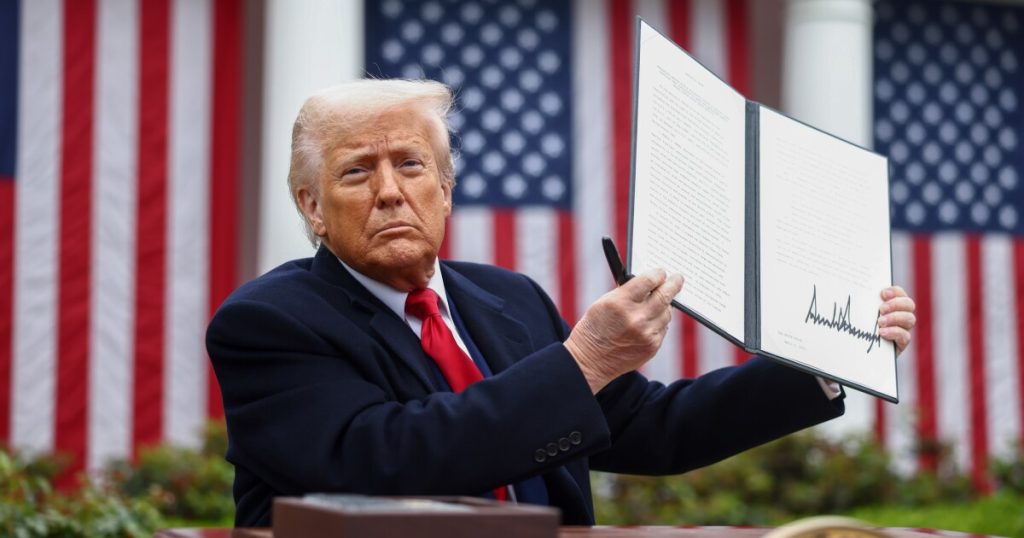Jim Lo Scalzo/Bloomberg
American payment systems rule the roost globally. That’s been good for the U.S. and the world. President Trump’s fusillade of threats, tariffs, weaponized uncertainty, and retaliatory taxes on imports from the U.S., however,
The U.S. Court of International Trade ruled that
Nevertheless, his trade war will continue, and the rulings won’t quell the
Foreign regulators will be on guard against increased dependence on American payment systems.
The first Trump administration blocked Ant Financial’s acquisition of money transfer network MoneyGram on national security grounds. U.S. payments businesses have used M&A to expand and deepen their footprints abroad. Foreign regulators will be less likely to green-light these businesses from acquiring major domestic payment networks and processors. If Mastercard tried to acquire pan-European interbank payment system EBA Clearing, regulators would block it. They would cast a skeptical eye on PayPal rolling up European mobile payment systems.
Countries relying on U.S. payment systems can reduce Washington’s ability to use them as cudgels of foreign or economic policy.
India, Indonesia and Türkiye, for example, require foreign payment systems to process domestic transactions in-country.
After Russia’s 2014 invasion of Ukraine, Washington cut off U.S. payment systems in Crimea. Moscow then forced Mastercard and Visa to use a Bank of Russia subsidiary to process domestic payments. When its tanks rolled into Ukraine in 2022 and the global payment networks cut off Russia, Mastercard and Visa cards issued by Russian banks continued to work domestically.
China mandated Mastercard use a joint venture with a Peoples’ Bank of China subsidiary to process domestic payments.
America’s global trade war will cause more countries to require U.S. payment systems to process in-country, increasing national control, and costs.
Displacing national incumbents will become more difficult for America’s payment titans. With greater network reach, scale, technology prowess, resources and features, U.S. payment systems often enjoy significant competitive advantages over domestic competitors. In many countries, Mastercard and Visa supplanted longstanding dominant domestic payment systems.
The Netherlands, Ireland, and Finland retired their national debit schemes PIN, Laser, and Pankkikortti in 2012, 2014, and 2010, respectively, replacing them with the global networks. In 2002, British banks sold their debit network Switch to Mastercard (Europay). In the current fraught climate, however, there’d be political pressure against those decisions.
Payment systems domiciled in the U.S. or otherwise influenced by U.S. policy play outsized roles in cross-border payments.
Mastercard and Visa are the two genuinely global retail payment networks. Even when there is a strong or monopoly domestic retail payment scheme, its payment cards are usually co-branded with Mastercard or Visa to enable international payments.
Swift is the world’s leading cross-border interbank payment-messaging network. While headquartered in Belgium, it’s subject to strong U.S. influence via Washington’s regulation of major U.S. money center banks, through which a disproportionate share of Swift payments ultimately clear. Would-be competitors including Russia’s
U.S. specialists like Payoneer, Corpay, and Ripple, money-transfer systems like Western Union, MoneyGram, Remitly, and PayPal, and the global card networks combine to provide cross-border payments worldwide.
King Dollar remains the world’s reserve currency, the principal currency in which foreign debt and trade outside the EU are denominated.
Digital currency evangelist and former chair of the U.S. Commodity Futures Trading Commission
Dollar-denominated stablecoins decidedly will boost the currency, if there’s not inordinate fear Washington may weaponize them. Tether, Circle, Ripple, PayPal, Binance, and some banks will seek roles in cross-border payments and in many national markets with weak national payment systems and debased national currencies. They won’t, however, be anonymous like the greenback.
To the discomfit of EU poohbahs in Brussels and Frankfurt, retail payment networks Mastercard and Visa and digital wallets PayPal, Apple Pay, and Google Pay are major pan-European payment systems. The euro-clerisy has long called for European payments sovereignty — i.e., relying on EU- rather than U.S.-domiciled payment systems. Trump’s tariffs and incendiary rhetoric will only increase that sentiment.
The European Central Bank has already stepped up calls for a digital euro.
EU regulators and politicians are cheering their latest would-be pan-European payments champion, the European Payments Initiative’s
And the European Mobile Payment Systems Association
Real-time interbank payment systems are critical national infrastructure. In many countries, U.S. firms like ACI Worldwide and Mastercard provide the technology. No country, however, wants to risk support for such vital systems being cut off.
It’s nigh impossible to weaponize a $100 bill. They’re accepted anywhere worldwide. Visa payments, however, can be weaponized. Domestically, they were subject to President Obama’s Operation Chokepoint and President Biden’s Operation Chokepoint 2.0 (“debanking”). Politicizing U.S. payment systems abroad or creating a fear that they may be politicized, spurs countries to develop alternatives, which is hardly in America’s national interest.

